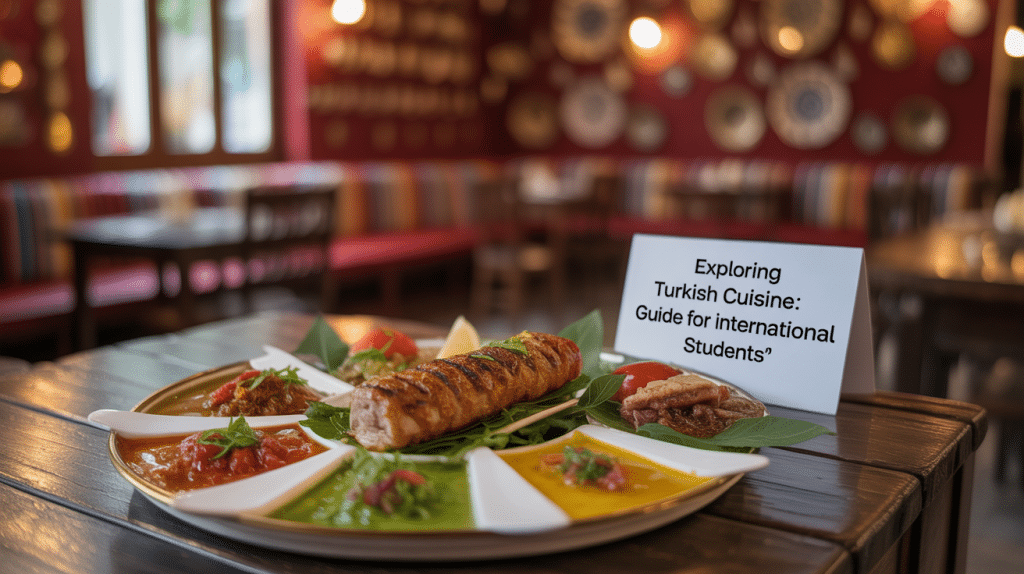Exploring Turkish Cuisine: A Guide for International Students
Staple Ingredients in Turkish Cooking
Regional Food Highlights
Essential Dishes to Try
Food Culture and Customs
Simple Recipe to Try
Tips for International Students
Connecting Back to Study in Türkiye
Conclusion
Overview of Turkish Cuisine
Turkish cuisine is a remarkable fusion of flavors, ingredients, and cooking styles. The simplicity of its staple ingredients coupled with complex flavors makes it an adventure for the palate. For international students, experiencing Türkiye’s distinctive food culture serves as a unique gateway to immerse yourself in local life and traditions.
Staple Ingredients in Turkish Cooking
- Olive oil and fresh herbs: Commonly used herbs include mint, dill, and parsley.
- Spices: Sumac, cumin, and red pepper flakes enhance the taste of various dishes.
- Meats: Lamb, beef, and chicken are popular, often grilled or slow-cooked.
- Legumes and grains: Lentils, chickpeas, and bulgur are key components of many meals.
- Fresh vegetables: Essential ingredients include eggplant, tomatoes, and peppers.
- Dairy products: Yogurt and cheese are vital, providing a creamy and tangy element that complements many Turkish meals.
Regional Food Highlights
Turkey is home to diverse culinary regions, each offering unique flavors and specialties. Here are some highlights:
- Mediterranean Region: Known for vegetable dishes steeped in olive oil and an abundance of fresh seafood.
- Istanbul & Marmara: Features fragrant rice dishes accompanied by breads like simit, a sesame-crusted bread ring.
- Eastern Türkiye: Renowned for sweet and flaky baklava and robust meat dishes.
- Central Anatolia: Known for hearty stews like keşkek, a comforting blend of meat, barley, and wheat.
Essential Dishes to Try
Here are some must-try foods that exemplify the richness of Turkish culinary culture:
- Simit: Crispy, sesame-crusted bread rings, often sold by street vendors.
- Pide: Often referred to as Turkish pizza, this flatbread can be topped with cheese, meats, or vegetables.
- Menemen: A traditional breakfast dish of scrambled eggs cooked with tomatoes, peppers, and spices.
- Börek: Flaky pastry filled with delicious combinations of cheese, spinach, or meat.
- Kebabs: Chargrilled meats served in various styles, each region offering its own twist.
- Baklava: A legendary sweet pastry layered with nuts and syrup, iconic in Turkish desserts.
- Turkish coffee and black tea: Fundamental to Turkish social gatherings, these beverages embody the nation’s hospitality.
Food Culture and Customs
Food in Türkiye is intertwined with social interactions and community. Sharing meals with friends or family is an integral part of life here. Engaging in leisurely breakfasts (known as kahvaltı) or enjoying meze platters (appetizer spreads) in local eateries exemplify the Turkish spirit of hospitality. Accepting an invitation to dine at someone’s home is an honor, revealing the warmth and generosity that characterize Turkish culture.
Simple Recipe to Try: Havuçlu Meze (Carrot Yogurt Dip)
For those interested in experiencing Turkish cuisine at home, here’s a straightforward recipe for Havuçlu Meze, a carrot yogurt dip:
Ingredients:
- 4 medium carrots (peeled and grated)
- 500g plain yogurt
- 2-3 cloves garlic (grated)
- ¼ bunch dill (chopped)
- 2 tbsp olive oil
- Salt to taste
Instructions:
- Heat olive oil in a frying pan, add grated carrots, and sauté until softened.
- Season with salt and remove from heat, allowing the carrots to cool.
- In a separate bowl, combine yogurt and grated garlic.
- Mix the cooled carrots into the garlic yogurt and add the chopped dill. Stir well.
- Garnish with parsley and serve chilled.
Tips for International Students
While navigating the culinary landscape of Türkiye, keep these tips in mind:
- Embrace variety: Turkish cuisine offers options for vegetarians, vegans, and meat lovers alike. There’s something for everyone.
- Explore local food markets and festivals: These gatherings are invaluable for discovering regional specialties and traditional foods.
- Seek recommendations: Whether you’re trying to decipher a menu or looking for the best local dish, don’t hesitate to ask locals for their favorite meals. They are often eager to share their culinary traditions.
Connecting Back to Study in Türkiye
At Study in Turkiye, we understand that food can be a significant aspect of your study experience. Alongside providing comprehensive support for international students, we emphasize the importance of cultural assimilation – and what better way to connect with a new culture than through its cuisine? By enrolling in one of our partner universities, such as Aydin University, Medipol University, or Istinye University, you will not only gain an exceptional education but also have the opportunity to embrace the diverse flavors of Turkish food.
Conclusion
Exploring Turkish cuisine as an international student is more than just tasting food—it’s a pathway to understanding Türkiye’s vibrant cultural mosaic. The warmth of Turkish hospitality, reflected in its culinary practices, will enrich your educational journey. We invite you to connect with us for comprehensive guidance, whether you’re looking to navigate the application processes, find the right university, or immerse yourself in local culture.
Take the Next Step with Study in Turkiye
Explore further and make your study experience unforgettable. Discover the culinary wonders that await you in Türkiye!

